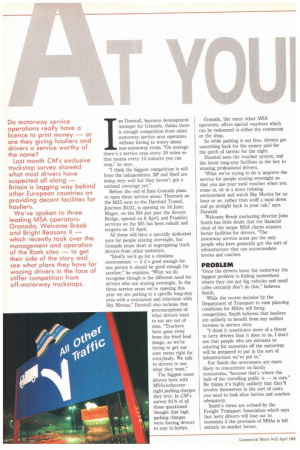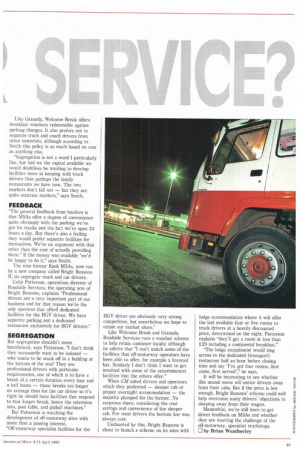1 an Dunstall, business development manager for Granada, thinks there
Page 50

Page 51

If you've noticed an error in this article please click here to report it so we can fix it.
is enough competition from other motorway service area operators without having to worry about non-motorway rivals. "On average there's a service area every 30 miles so that means every 15 minutes you can stop," he says.
"I think the biggest competition is still from the independents. BP and Shell are doing very well but they haven't got a national coverage yet."
Before the end of June Granada plans to open three service areas: Thurrock on the M25 next to the Dartford Tunnel, Junction 30/31, is opening on 16 June; Magor, on the M4 just past the Severn Bridge, opened on 8 April; and Frankley services on the M5 has been rebuilt and reopens on 10 April.
All three will have a specially dedicated area for people staying overnight, but Granada stops short at segregating truck drivers from other motorists.
"Ideally we'd go for a classless environment — if it's good enough for one person it should be good enough for another," he explains. "What we do recognise though is the different need for drivers who are staying overnight. In the three service areas we're opening this year we are putting in a specific long-stay area with a restaurant and television with Sky Movies." Dunstall also reckons that preconceptions of what drivers want to eat are out of date. "Truckers have gone away from the fried food image, so we're trying to get our core menu right for everybody. We talk to drivers to see what they want."
The biggest moan drivers have with MSAs is the overnight parking charges they levy. In CM's survey 81% of all those questioned thought that high parking charges were forcing drivers to stay in laybys. Granada, like many other MSA operators, offers special vouchers which can be redeemed in either the restaurant or the shop.
So while parking is not free, drivers get something back for the money paid for the patch of tarmac for the night.
Dunstall sees the voucher system, and the latest long-stay facilities as the key to winning professional drivers.
"What we're trying to do is improve the service for people staying overnight so that you use your meal voucher when you come in, sit in a more relaxing environment and watch Sky Movies for an hour or so, rather than scoff a meal down and go straight back to your cab," says Dunstan.
Welcome Break marketing director John Smith has little doubt that the financial clout of the larger MSA chains ensures better facilities for drivers. "The motorway service areas are the only people who have generally got the sort of infrastructure that can accommodate lorries and coaches.
PROBLEM
"Once the drivers leave the motorway the biggest problem is finding somewhere where they can put big vehicles and small cafes certainly don't do that," believes Smith.
While the recent decision by the Department of Transport to ease planning conditions for MSAs will bring competition, Smith believes that hauliers are unlikely to benefit from any sudden increase in service sites.
"I think it constitutes more of a threat to lorry drivers than it does to us. I don't see that people who are entrants to catering for motorists off the motorway will be prepared to put in the sort of infrastructure we've put in."
For Smith the newcomers are more likely to concentrate on family restaurants, "because that's where the bulk of the travelling public is — in cars." He thinks it's highly unlikely that they'll involve themselves in the sort of costs you need to look after lorries and coaches adequately.
Smith's views are echoed by the Freight Transport Association which says that lorry drivers will lose out to motorists if the provision of MSAs is left entirely to market forces. Like Granada, Welcome Break offers breakfast vouchers redeemable against parking charges. It also prefers not to separate truck and coach drivers from other motorists, although according to Smith this policy is as much based on cost as anything else.
"Segregation is not a word I particularly like, but had we the capital available we would doubtless be wanting to develop facilities more in keeping with truck drivers than perhaps the family restaurants we have now. The two markets don't fall out — but they are quite separate markets," says Smith.
FEEDBACK
"The general feedback from hauliers is that MSAs offer a degree of convenience quite obviously with the parking we've got for trucks and the fact we're open 24 hours a day. But there's also a feeling they would prefer separate facilities for themselves. We've no argument with that other than the cost of actually providing them." If the money was available "we'd be happy to do it," says Smith.
The nine former Rank MSAs, now run by a new company called Bright Reasons II, do segregate truck and car drivers.
Colin Patterson, operations director of Roadside Services, the operating arm of Bright Reasons, explains: "Professional drivers are a very important part of our business and for that reason we're the only operator that offer g dedicated facilities for the HGV driver. We have separate parking and a dedicated restaurant exclusively for HGV drivers."
SEGREGATION
But segregation shouldn't mean banishment, says Patterson. "I don't think they necessarily want to be isolated — who wants to be stuck off in a building at the bottom of the site? They are professional drivers with particular requirements, one of which is to have a break of a certain duration every four and a half hours — those breaks are longer on average than for the car driver so it's right he should have facilities that respond to that longer break, hence the television sets, pool table, and pinball machines."
But Patterson is watching the development of off-motorway sites with more than a passing interest. "Off-motorway specialist facilities for the HGV driver are obviously very strong competition, but nonetheless we hope to retain our market share."
Like Welcome Break and Granada, Roadside Services runs a voucher scheme to help retain customer loyalty although he admits that "I can't match some of the facilities that off-motorway operators have been able to offer, for example a licenced bar. Similarly I don't think I want to get involved with some of the entertainment facilities that the others offer."
When CM asked drivers and operators which they preferred — sleeper cab or proper overnight accommodation — the majority plumped for the former. No surprises there, considering the cost savings and convenience of the sleeper cab. For most drivers the bottom line was always cost.
Undaunted by this, Bright Reasons is about to launch a scheme on its sites with lodge accommodation where it will offer the last available four or five rooms to truck drivers at a heavily discounted price, determined on the night. Patterson explains 'they'll get a room at less than £20 including a continental breakfast."
"The lodge receptionist would ring across to the dedicated (transport) restaurant half an hour before closing time and say 'I've got four rooms, first come, first served'," he says.
It will be interesting to see whether this unusal move will entice drivers away from their cabs. But if the price is low enough, Bright Reasons' scheme could well help overcome many drivers' objections to sleeping away from their wagon.
Meanwhile, we're still keen to get driver feedback on MSAs and whether they are meeting the challenge of the off-motorway, specialist truckstops. 1:1 by Brian Weatherley




























































































